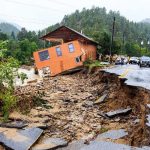With the New Year comes exciting news from C-Change Conversations. This month we celebrate the milestone of delivering our Climate Change Primer presentation to 14,000 people in 31 states. In 2020 alone, we gave the presentation 32 times! We aim to double this record-setting number in 2021.
How will we do it? As you’ll learn below, we have created new Primer presentations tailored to specific topics and audiences, and are training more presenters. C-Change is very grateful for and relies on friends like you who continue to recommend our non-partisan, science-based Primer to your companies, associations, clubs, and other groups, and who support us with generous donations.
We couldn’t do any of this without the extraordinary efforts of our 28 volunteers in Princeton, St. Louis, and beyond. Here’s to them, and a happy, healthy, and hopeful 2021 for all.
Warmly,
Kathleen Biggins
Founder and President
C-Change Conversations
New Presentations Cover More than Just Climate Change
C-Change has developed new Primer presentations, both in response to the times and unique audience interests. For example, new Primers focus on:
- COVID-19 – shows parallels between two global crises – the pandemic and climate change – and explores lessons we can learn from each.
- Health – describes how climate change harms each of five pillars that are essential to good health: physical safety and shelter, adequate food, safe water supply, disease management, and clean air.
- Business – focuses on evaluating business risks of climate change, such as disruptions to markets and supply chains, and regulatory and reputational risks. We developed this presentation for and presented it to employees of Snowden Lane Partners (wealth management) and Callaway Henderson (part of Sotheby’s).
C-Change is expanding our reach in other ways. In February, we will present our original (but up-to-date) Primer to a conference of New Jersey public school educators. This talk will provide middle and high school teachers with the foundation they need to integrate climate change education throughout the core curricula. Climate change is not just for science class anymore!
C-Change is open to adapting our presentations and sharing them with a wide array of groups. Please contact us to learn more.
Meet the Team
As part of our ongoing effort to showcase the volunteers who work so hard to fulfill our mission, we are pleased to introduce Pam Parsons, a lynchpin of our organization.
Pam Parsons is our “steel magnolia.” She is warm, gracious, and delightful to work with, but she is also one tough cookie – masterful at keeping our volunteers pointed in the same direction and our many projects running smoothly. She oversees our internal systems and is a critical part of our institutional glue. Pam led a successful career in interior design, real estate, and marketing and communications before “retiring.” Her work on behalf of C-Change, however, is like a full-time job!
From Pam:
Why I am involved with C-Change: I grew up deeply embedded in the environment of the Blue Ridge Mountain foothills with all its fabulous fauna and flora. As I read more and more about climate change and its facts, statistics, and threats and began to observe its actual effects, I began to fear that I would be one of the last generations that would see and experience what I had as a child. That pushed me to be a more conscientious inhabitant of my world but not until I learned the science behind the issues did I understand the true scope of what is required to correct the dire trajectory. This is what C-Change Conversations does so well: it presents science-based facts about climate change that lead to an understanding of the issues that then leads to meaningful action. I’m pleased to be a C-Change team member and advocate for its mission of climate change education and perhaps help protect the health and well-being of my foothills.
What have you learned about climate change that makes you hopeful? The exciting technologies that are being developed for and applied to aspects of climate change make me very hopeful. Starting with emissions, curbing them is not enough but carbon removal systems such as direct air capture, zero-carbon fuels, and nuclear-fusion-energy could be meaningful. A British company is working on a plant-based plastic, the process of biodigesting turns cow manure’s methane into power, a new class of large-storage batteries is being developed that could power an electric car for up to 8 hours, and in Rotterdam 100 acres of green roofs have increased the city’s water storage by 1.6 million gallons. So, if there is science behind the reasons for climate change, then science can be behind the solutions.
New Primer Presenters Extend Our Reach
C-Change is pleased to introduce another recent graduate of our presenter training program and a new team member. Welcome, Joan Schiller!
Dr. Joan H. Schiller is a widely published medical oncologist who is internationally recognized for her work in lung cancer clinical research. She is also passionate about climate change and its impact on health. Joan is the author of Global Warming, COVID-19, and Lung Cancer: Why Lung Cancer Doctors Should Care about Climate Change and Why Oncologists Should Care About Climate Change. She is currently a board member of the Lung Cancer Research Foundation and an Adjunct Professor at the University of Virginia, and lives in the Washington, D.C. area.
While it may seem natural that someone whose distinguished career was concerned with improving lung health would be drawn to a cause that works for cleaner air, Joan’s decision to join C-Change was very personal. “I have been so blessed in my life,” she said. “In addition to traveling and enjoying the great outdoors, we also have a cabin in the beautiful mountains in southwest Colorado. Recently, I became a grandmother to the two cutest kids ever! And then it dawned on me — they won’t be able to enjoy the things I have been lucky enough to experience, such as beautiful forests, waterfalls, or just watching snow fall — because those things will no longer be there due to climate change. How will I be able to face them in 10 or 15 years if the beautiful things on earth are gone, and I did not try my best to stop it?” C-Change is very fortunate to have such an accomplished, caring person sharing our message.
C-Change Team Members to Play Prominent Role in National Conference
For the fifth consecutive year, C-Change Conversations will feature prominently in the annual Garden Club of America (GCA) National Affairs and Legislation Conference, which will be held virtually February 23-25, 2021. The theme is “Climate Change Solutions,” and once again the agenda features members of Congress and many other prominent speakers, including three C-Change team members.
To kick things off, Kathleen Biggins will introduce and moderate a panel discussion with the two keynote speakers: Christy Goldfuss and Tim Profetas. Christy was managing director of the White House Council on Environmental Quality from 2015-17 and is now senior vice president at the Center for American Progress. Tim is founder and director of Duke University’s Nicholas Institute for Environmental Policy, a major non-partisan player in key environmental debates.
Katy Kinsolving, a C-Change co-founder, serves as GCA’s Vice Chair for Agriculture. She will introduce a session on regenerative agriculture and several distinguished speakers on the topic. Later, conference participants will see Katy’s brief video on the importance of good food choices in reducing emissions.
And finally, C-Change team member Sophie Glovier will speak on what we can do to help our communities take action on climate change. Read her blog on this topic here. Sophie is GCA’s Vice Chair for Waste Management.
Op-Eds: Tackle Climate Change Like We Tackle Cancer
Dr. Joan Schiller (see profile above), along with other oncologists and Primer trainees, urged state policymakers to “tackle climate change like we tackle cancer” in recent op-eds that appeared in the Richmond Times-Dispatch and northjersey.com, which is part of the USA Today network.
C-Change seeks opportunities like these to educate audiences about the adverse health effects of climate change. We invite you to submit your questions about climate change and health here.


